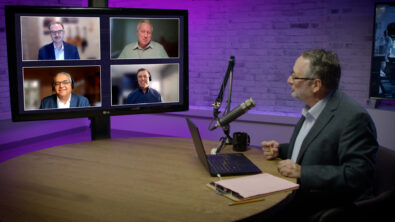MBSE is an accelerator for every industry

Our world is full of innovative technologies that enable our modern lives. And the development of these advancements has relied on a traditional process of think, build, and iterate to create the best products for an application. But the rate of growth today is pushing beyond the feasibility of that structure. Businesses and entire industries are bustling to adopt the solution to their growing complications to development. And model-based systems engineering, or MBSE, is at the center of that transformation, alongside digitalization.
There are many paths to take into the future of industry, which is why Siemens experts from some of the top industries feeling this pressure sat down at the Engineering Roundtable to talk about the reality of industry and MBSE. Our team from Siemens was also joined by an industry analyst from CIMdata and the host of this discussion from Engineering.com:
- Todd Tuthill – VP, Aerospace & Defense Strategy and Marketing, Siemens
- Nand Kochhar – VP, Automotive & Transportation Industry Strategy, Siemens
- Mark Malinoski – MBSE Solutions Director, Siemens EDA
- Donald Tolle – Director, Systems Engineering & Simulation, CIMdata
- Jim Anderton – Content Director, Engineering.com
Model-based systems engineering and its value to industry are very important topics to understand for any industry working with complex products. That might be integrating consumer demand and market requirements with the more traditional development processes, but it can also be communicating relevant technical information between engineering domains in increasingly interconnected products. The variability of what it means is why it is so important to look at different industry perspectives, even if an industry already has a grasp on the MBSE methodology – to uncover a process that might work from somewhere else.
But beyond the general incentives to why you might want to listen to such a diverse and knowledgeable group of experts there are a couple highlights that you might find important, either to take away today or as a reason to listen in when the full discussion is available. The first is a point from Donald Tolle and which is increasingly relevant to every industry today – is that while the realms of mechanical development, electronics development, and software development have created organizing structures through their own experience, communication between them will be paramount for the connected products being made today and especially those of tomorrow. These structures cover early concept design to near end-of life, but to best optimize connected systems that information needs to be available to other groups as it makes sense.
The variety and variability of complex products does not stop at the number of disciplines involved, it extends into things like how a subsystem in manufactured, where it comes from, its impact on overall system performance and much more. MBSE provides the framework to collect data on these facets of development, the comprehensive digital twin technology to analyze possibilities, and the communication network to make optimal decisions across exceeding large value chains. For example, the electronics domain covers the largest swing in scale of almost any industry – ranging from nanometer sized nodes on silicon wafers to building-scale power management systems for the electric grid. It is also important to understand the often-fuzzy boundaries within a product, not just within an industry.
These are just two very preliminary take-aways from such a detailed and valuable discussion. And if these simply start to scratch an itch to learn more, you’ll want to make sure you check out the landing page to listen to the full discussion on Engineering.com. And if you can’t commit to the full hour-long discussion, be sure to check back here or at Engineering.com for a condensed and written analysis of the discussion. If you are looking for more information on MBSE today, our topic page has some great information to get you started on your journey to adopting model-based systems engineering.
Siemens Digital Industries Software is driving transformation to enable a digital enterprise where engineering, manufacturing and electronics design meet tomorrow. Xcelerator, the comprehensive and integrated portfolio of software and services from Siemens Digital Industries Software, helps companies of all sizes create and leverage a comprehensive digital twin that provides organizations with new insights, opportunities and levels of automation to drive innovation.
For more information on Siemens Digital Industries Software products and services, visit siemens.com/software or follow us on LinkedIn, Twitter, Facebook and Instagram.
Siemens Digital Industries Software – Where today meets tomorrow


